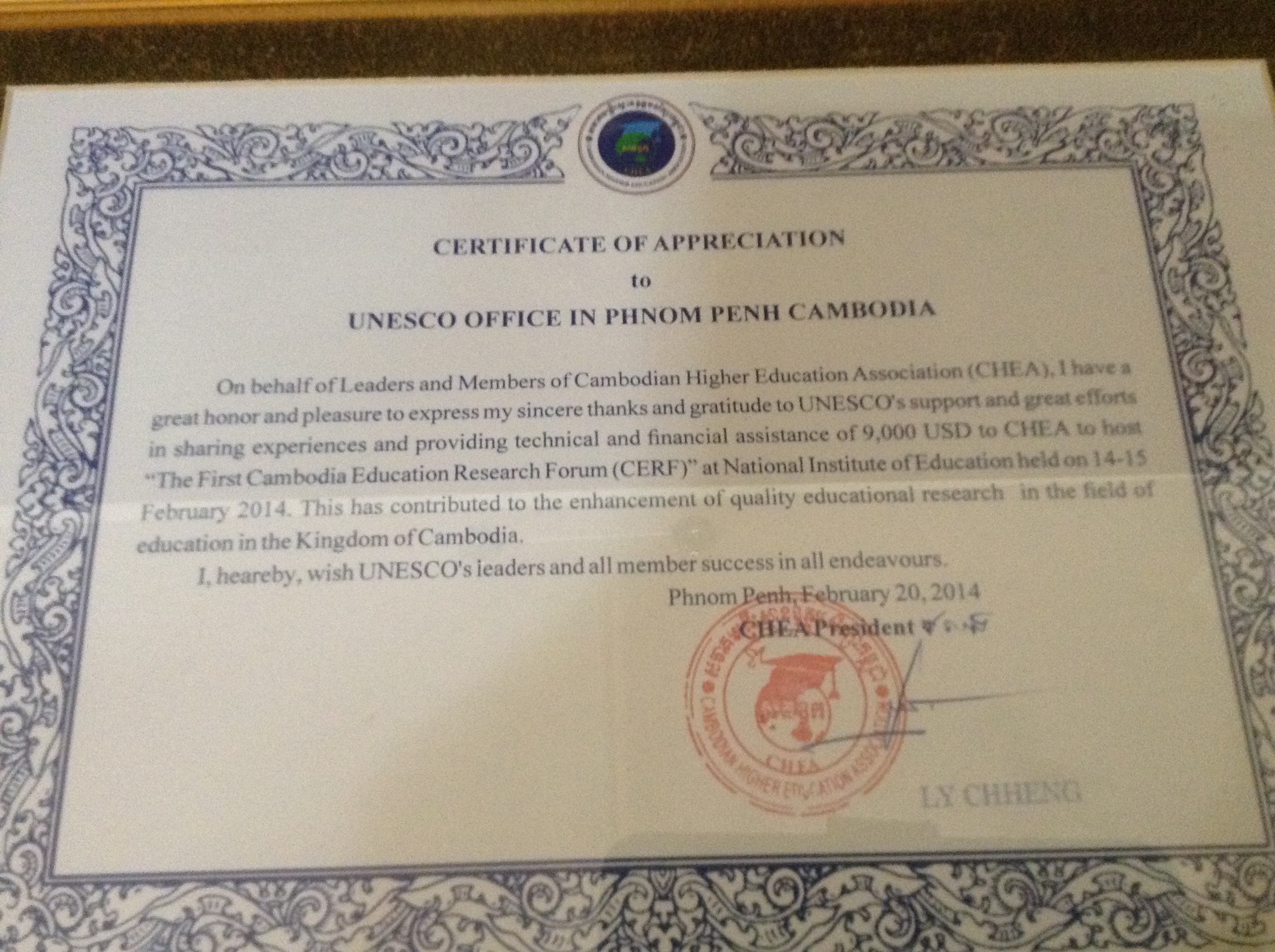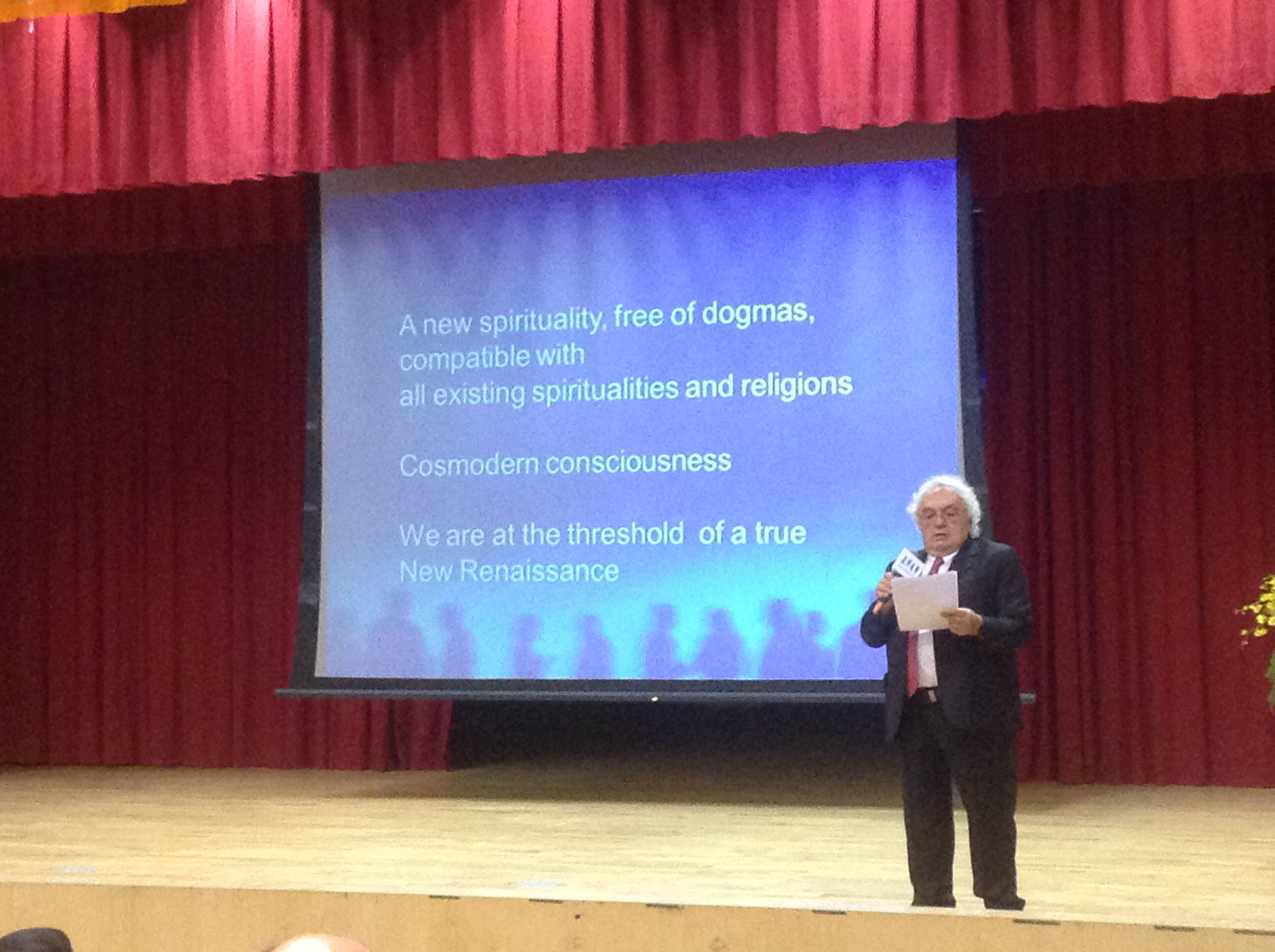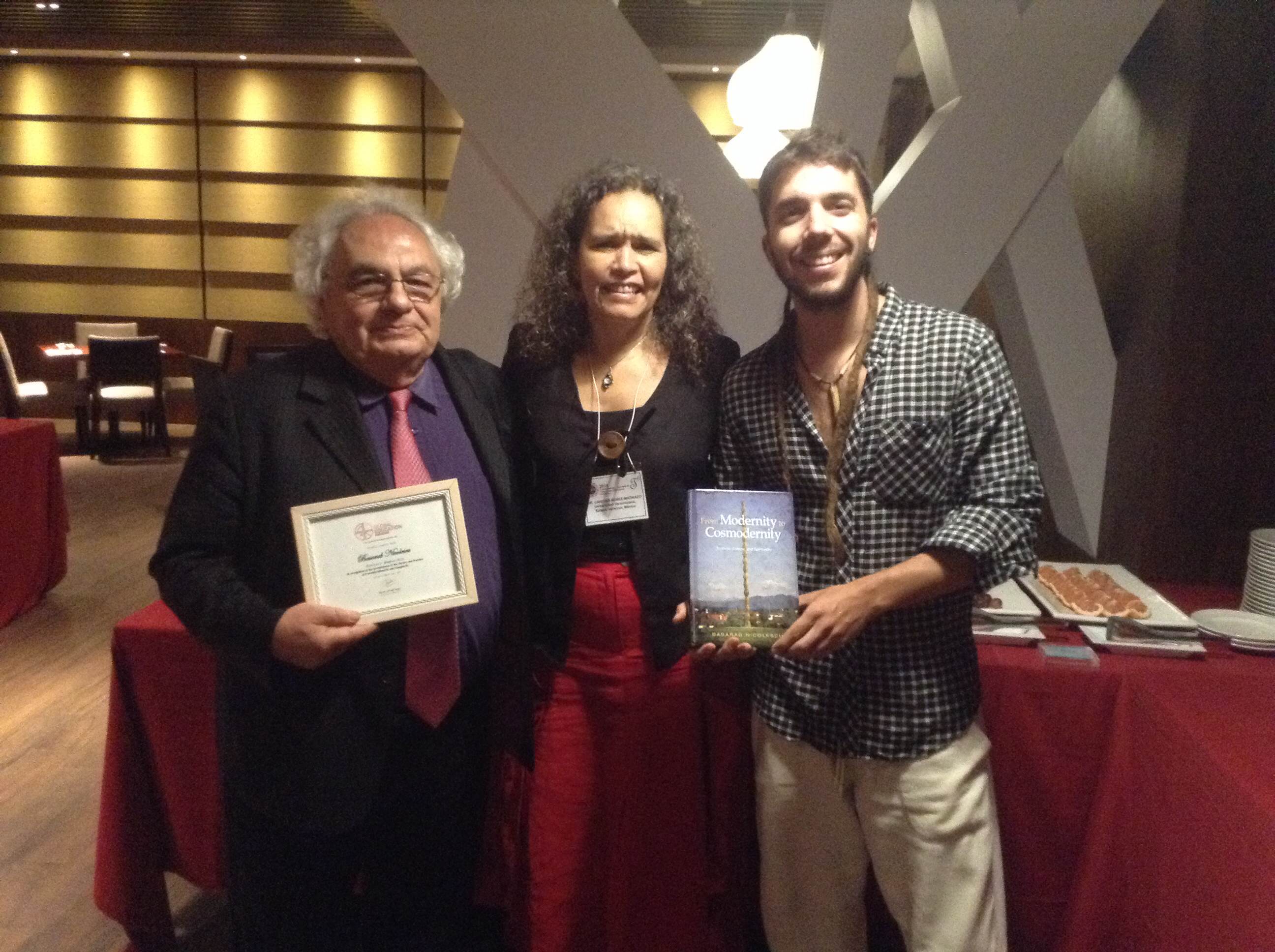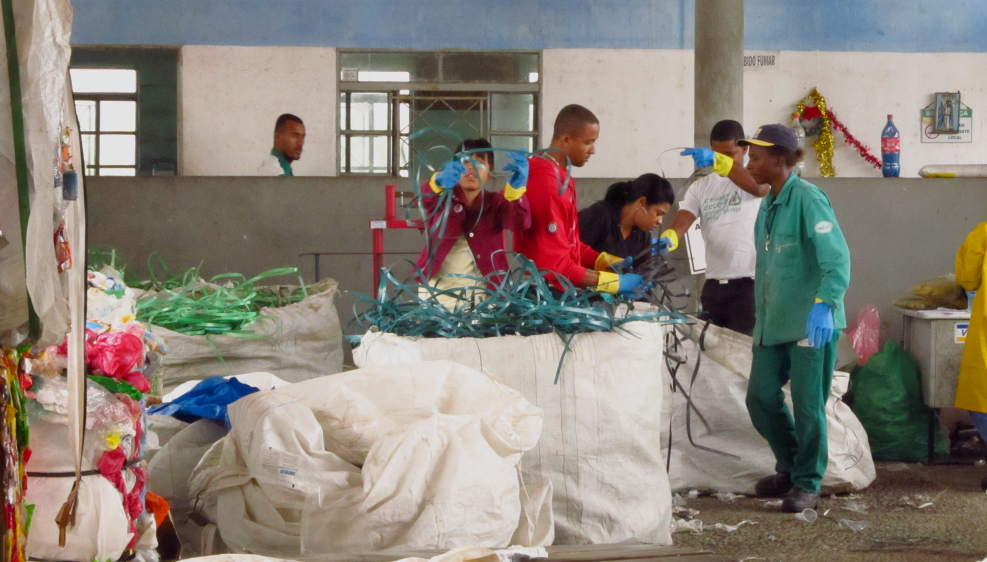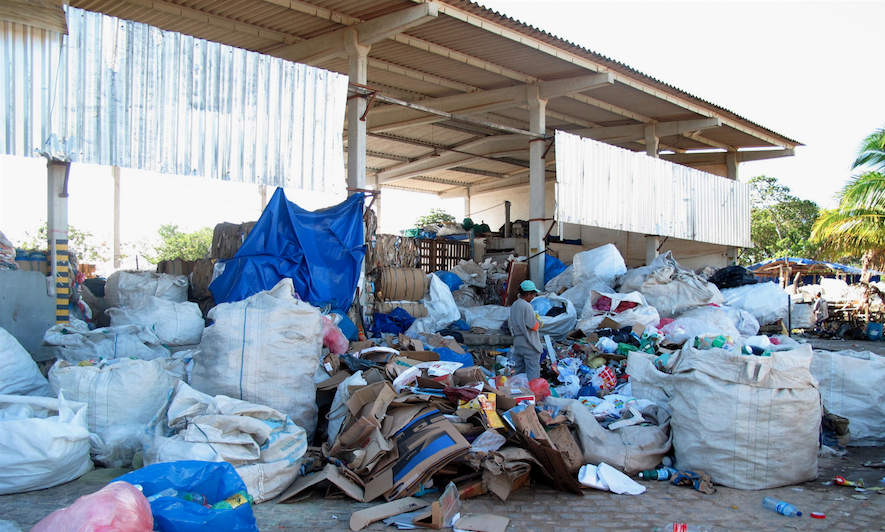Participantes del Foro Mundial de la Educación en la ceremonia de despedida
El Foro Mundial de la Educación tuvo lugar entre los días 18 y 21 de mayo del año 2015 en Incheon, República de Corea. Más de 1.500 participantes fueron invitados por la Directora General de la UNESCO, Irina Bokova, donde destacan Ministros de Educación y Cultura de más de 100 países, jefes y miembros de delegaciones, jefes de agencias y ejecutivos de organizaciones multilaterales y bilaterales y representantes de la sociedad civil, la profesión docente, los jóvenes y el sector privado. Junto a la UNESCO, el gobierno coreano, UNICEF, el Banco Mundial, FNUAP, PNUD, ONU Mujeres y ACNUR contribuyeron a liderar el evento que marca un hito para la Educación 2030.
En esta histórica ocasión, los participantes han reafirmado la visión del movimiento mundial por la Educación para Todos (EPT) iniciada en Jomtien en 1990 y reiterado en Dakar en 2000 – el compromiso más importante en educación en décadas recientes, el cual ha impulsado progreso significativo en educación. Habiendo tomado nota del progreso realizado hacia las EPT desde el 2000 y de los Objetivos de Desarrollo del Milenio (ODM) relacionados con la educación, así como de las lecciones aprendidas, y habiendo examinado los desafíos pendientes y deliberado sobre la agenda de educación 2030 propuesta, su Marco de Acción, y las prioridades futuras y estrategias para su logro, los participantes han adoptado la Declaración de Incheon «Educación 2030: Hacia una educación inclusiva, equitativa y de calidad y aprendizaje a lo largo de la vida para todos».
Antes del inicio oficial del Foro Mundial de la Educación 2015, también tuvo lugar el Foro de ONG 2015, donde se aprobó la Declaración del Foro ONG 2015 “Hacia el derecho a la educación pública, inclusiva y de calidad y el aprendizaje a lo largo de toda la vida después de 2015“.
Durante la rueda de prensa celebrada después de la ceremonia de apertura del Foro Mundial de Educación, la Directora General de la UNESCO, Irina Bokova, y el Secretario General de las Naciones Unidas, Ban Ki-moon, expresaron el papel importante de construir una ciudadanía mundial para tener éxito con las metas educativas de 2030 de los Objetivos de Desarrollo Sostenible.
World Education Forum. 19-22 May 2015, Incheon, Republic of Korea, Global Education Magazine from Global Education Magazine
Javier Collado Ruano entrevistó al Premio Nobel de la Paz 2014, Sr. Kailash Satyarthi
Durante el Foro Mundial de la Educación 2015 destacó la presencia del Sr. Kailash Satyarthi (arriba), Premio Nobel de la Paz de 2014 junto a Malala Yousafzai, al cual tuvimos la oportunidad de conocer personalmente y entrevistarle para la próxima edición de Global Education Magazine, con motivo del Día Internacional de la Juventud.
Representantes y Ministros de Educación y Cultura de América Latina y el Caribe reunidos en el Foro Mundial de la Educación 2015 durante el comunicado conjunto del 21 de Mayo.
En armonía con la nueva agenda educativa 2030, los Ministros de Educación y Cultura de América Latina y el Caribe elaboraron un comunicado oficial donde se comprometieron a avanzar a sistemas educativos de calidad, reafirmando que la educación es un derecho humano fundamental, la base para la garantía de la realización de otros derechos, y es esencial para la prosperidad y un crecimiento pacífico, inclusivo, equitativo y sostenible en la región. Durante los encuentros, también tuvimos la oportunidad de entrevistarnos con el Ministro de Educación de Brasil, Sr. Renato Janine Ribeiro (izquierda), y el Ministro de Educación del Estado Plurinacional de Bolivia, el Sr. Roberto Aguilar Gómez (derecha).
El Foro Mundial de la Educación 2015 sirvió como punto de encuentro entre los diferentes agentes educativos a nivel mundial para promover contextos participativos de inclusión a la diversidad cultural y para alcanzar las metas de desarrollo sostenible de la agenda post-2015. Un compromiso fijado en Rio+20 donde el Open Working Group liderado por el Prof. Jeffrey Sachs viene trabajando en los últimos meses para elaborar los objetivos e indicadores de los nuevos Objetivos de Desarrollo Sostenible (ODS) para 2030, donde la educación ocupa el ODS 4 y busca asegurar una educación inclusiva, equitativa y de calidad promoviendo un aprendizaje para toda la vida para todos y todas.
Javier Collado Ruano junto a Jeffrey Sachs, coordinador del Open Working Group
Participants of the World Education Forum after the Closing Ceremony
The World Education Forum 2015 took place in May 18-21, in Incheon, Republic of korea. More than 1,500 participants were invited by the UNESCO Director General Irina Bokova, with more than 100 Ministers of Education, heads and members of delegations, heads of agencies and officials of multilateral and bilateral organizations, and representatives of civil society, the teaching profession, youth and the private sector. Along UNESCO, the Government of Korea, UNICEF, the World Bank, UNFPA, UNDP, UN Women, and UNHCR, made contributions to lead this milestone event for Education 2030.
On this historic occasion, we reafirm the vision of the worldwide movement for Education for All (EFA) initiated in Jomtien in 1990 and reiterated in Dakar in 2000 – the most important commitment to education in recent decades and which has helped drive significant progress in education. Having taken stock of progress made towards the EFA goals since 2000 and the education-related Millennium Development Goals (MDGs) as well as the lessons learned, and having examined the remaining challenges and deliberated on the proposed 2030 education agenda and the Framework for Action as well as on future priorities and strategies for its achievement, the participants have adopted the Incheon Declaration «Education 2030: Towards inclusive and equitable quality education and lifelong learning for all.«
Before the official start of the World Education Forum 2015, the 2015 NGO Forum took place with civil society represents from all the world, where was asopted the «2015 NGO Forum Declaration: Towards the Right to Inclusive Quality Public Education and Lifelong Learning Beyond 2015.«
During the press conference celebrated after the Open Ceremony of the World Education Forum 2015, UNESCO Director-General Irina Bokova, and the Secretary-General of the United Nations, Ban Ki-moon, they expressed the important role of building a global citizenship to be succeed with the educational targets of the Sustainable Development Goals for 2030.
World Education Forum. 19-22 May 2015, Incheon, Republic of Korea, Global Education Magazine from Global Education Magazine
Javier Collado Ruano interviewing Mr Kailash Satyarthi, Laureate of the 2014 Nobel Peace Prize
The presence of Mr. Kailash Satyarthi (avobe), 2014 Nobel Peace Prize along Malala Yousafzai, was highlighted in the World Education Forum 2015. Javier Collado had the opportunity to interview him for the next edition of Global Education Magazine, with occasion of the International Youth Day.
Representatives and Ministers of Education and Culture of Latin America and the Caribbean gathered at the World Education Forum 2015 during the May 21 joint statement.
In harmony with the new educational agenda 2030, the Ministers of Education and Culture of Latin America and the Caribbean prepared an official statement in which they compromised to advance in quality education systems, reaffirming that education is a fundamental human right, the basis for ensuring the realization of other rights, and is essential for prosperity and peaceful, inclusive, equitable, and sustainable growth in the region. During the meetings, we also had the opportunity to interview the Minister of Education of Brazil, Mr. Renato Janine Ribeiro (left) and Minister of Education of the Plurinational State of Bolivia, Mr. Roberto Aguilar Gomez (right).
The World Education Forum 2015 was a meeting point between the different educational agents worldwide to promote participatory contexts and including cultural diversity to achieve the targets of post-2015 sustainable development agenda. A commitment fixed in Rio+20 where the Open Working Group led by Prof. Jeffrey Sachs has been working in the last months to elaborate the objectives and indicators of the new Sustainable Development Goals (ODS) for 2030, where education is the SDG4 and seeks to ensure an inclusive, equitable and quality education promoting lifelong learning for all.
Javier Collado Ruano along Jeffrey Sachs, coordinator of the Open Working Group

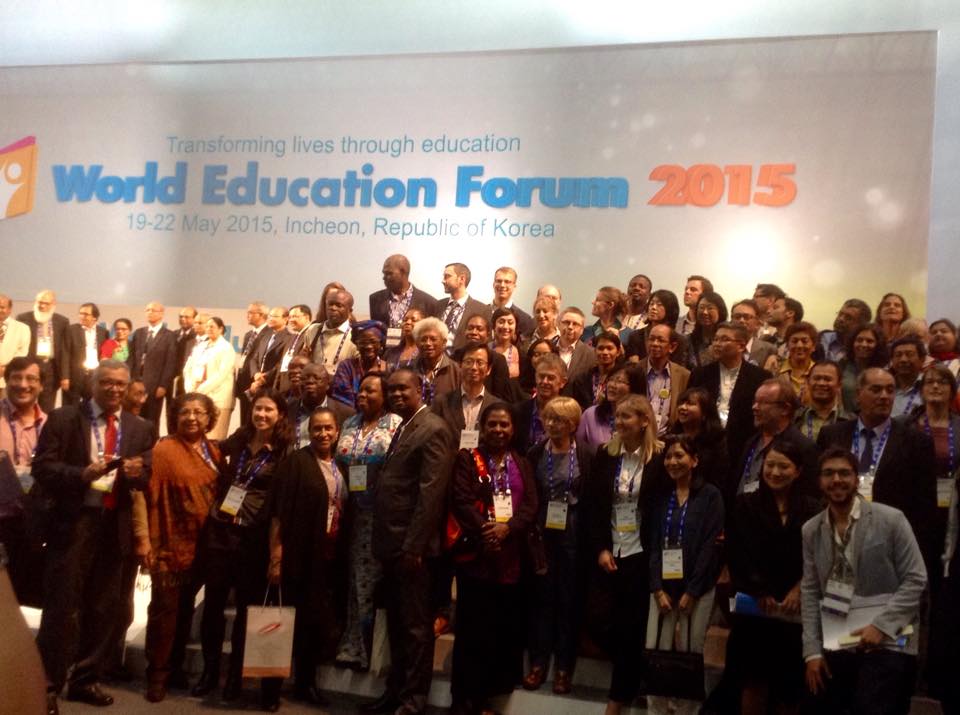



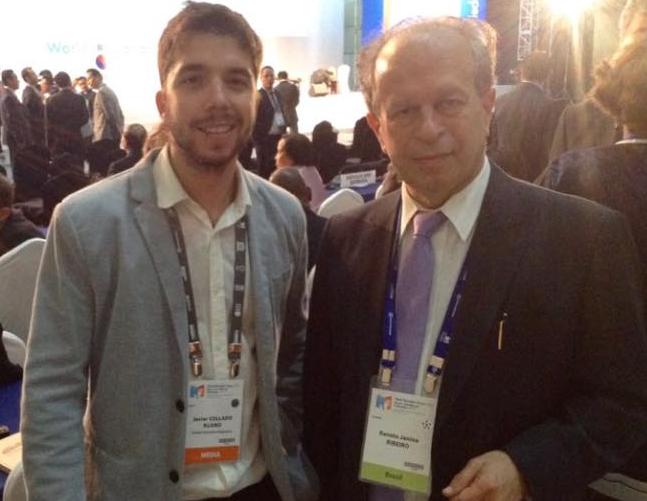








 El pasado mes de Junio de 2014, Javier Collado tuvo la oportunidad de encontrarse con el Sr. Mr. Santosh Khatri, Especialista en Educacion en UNESCO Cambodia. Durante el encuentro el Sr. Khatri hablo sobre el trabajo de UNESCO con el Ministerio de Educacion en Cambodia, los programs especiales desarrollados para combatir el analfabetismo, el bajo numero de estudiantes en las escuelas y tambien sobre la futura Educacion para la Ciudadania Global propuesta por la UNESCO.
El pasado mes de Junio de 2014, Javier Collado tuvo la oportunidad de encontrarse con el Sr. Mr. Santosh Khatri, Especialista en Educacion en UNESCO Cambodia. Durante el encuentro el Sr. Khatri hablo sobre el trabajo de UNESCO con el Ministerio de Educacion en Cambodia, los programs especiales desarrollados para combatir el analfabetismo, el bajo numero de estudiantes en las escuelas y tambien sobre la futura Educacion para la Ciudadania Global propuesta por la UNESCO.